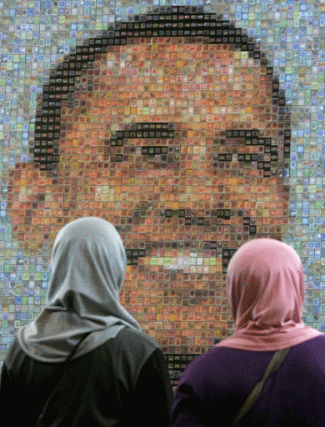Egypt: Stability Cannot Be Grounded in Dictatorship
Posted on | februari 14, 2011 | No Comments
 Stable Dictatorship! What is it? The fear that the chaos engulfing Egypt may provide opportunity to anti-American radical Islamic militants to seize power is prompting some Western pundits, journalists, and the Mubarak regime to frame the solution to Egypt’s current crisis as a choice between “chaotic democracy” or “stable dictatorship.” This discourse is also prevalent in the corridors of the Obama administration, as evidenced by the White house’s flip-flopping stance against Murbarak throughout the course of this saga.
Stable Dictatorship! What is it? The fear that the chaos engulfing Egypt may provide opportunity to anti-American radical Islamic militants to seize power is prompting some Western pundits, journalists, and the Mubarak regime to frame the solution to Egypt’s current crisis as a choice between “chaotic democracy” or “stable dictatorship.” This discourse is also prevalent in the corridors of the Obama administration, as evidenced by the White house’s flip-flopping stance against Murbarak throughout the course of this saga.
Of course, this thinking stems, at least for the Obama Administration, from the need to balance between supporting the anti-Mubarak protestors and not undermining a repressive, but staunchly pro-American ally in Cairo. But for the thousands in the Tahrir square, the definition between dictatorship and stable dictatorship matters little. There is nothing like stable dictatorship, but a military dictatorship is what Egypt has been for 30 years under Mubarak, nothing more and nothing less. For 30 years, Mubarak has been using the fear of instability and radical Islamic takeover to intimidate and manipulate the political process to his own advantages.
What we are seeing in the streets of Cairo is an uprising for more democracy, freedom and economic development against less marginalisation and corruption. There is no exception to democracy, period. Stability should be grounded in democracy, not in fear and dictatorship. It is this fear, intimidation, and repression that the US has been supporting for thirty years, not stability. Therefore, the US should not fall prey to this stability versus instability narrative, and instead should tell Mubarak in unequivocal terms that US dollars can no longer be used to support repression in Egypt.
Note: This blog entry, obviously, was written before Mubarak’s resignation.
 AUTHOR: Ndumba Jonnah Kamwanyah
AUTHOR: Ndumba Jonnah Kamwanyah
URL: http://foreignpolicyblogs.com/
E-MAIL: Ndumba.Kamwanyah [at] umb.edu
Comments
Leave a Reply











